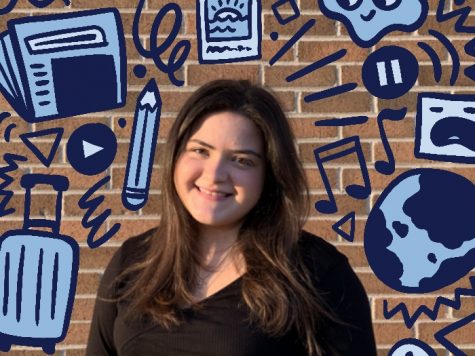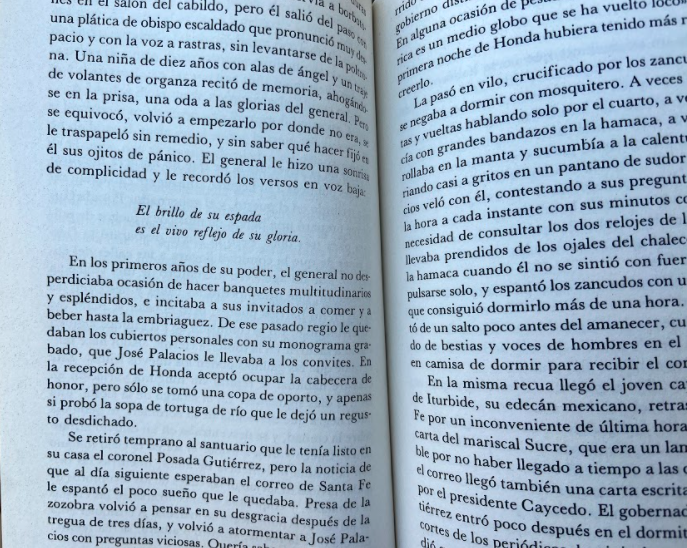The top ten works I read in my English courses: an unofficial review
An unofficial review of some of the materials I read throughout my four years of English classes.
Over the course of my four years here at DGS I have enjoyed many of my classes, but I think anyone who has shared the English classroom with me knows that is where I am happiest. Reading, analyzing and discussing books brings me a pure, unadulterated joy, even when I don’t love the book we are reading as part of the course. Below is an unofficial review of the materials I studied in my English courses — from a student who was undoubtedly the most content when she had a book in her hand and a classroom to share her thoughts with.
10. “Fahrenheit 451” by Ray Bradbury
I really enjoy Rad Bradbury’s other works, especially his short stories, such as “The Veldt”, “The Pedestrian”, “All Summer in a Day”, “The April Witch” and various others. This book however, bores me beyond belief. I know it’s a classic in American literature, but everytime I read this book — and I’ve read it four times, at various points in my life — it falls flat for me.
So while I respect it’s validity as part of the freshman year curriculum, I’ll be sticking to Bradbury’s short stories from now on.
What I Learned: Not all classics have to be “good” from your perspective. You don’t have to like all of them either, though you can still appreciate them.
9. “Antigone” by Sophocles
Don’t get me wrong, I love a good Greek tragedy as much as the next person, but in the grand list of books I read in English class, this wasn’t that high up there. I will give it the benefit of the doubt because I was a very young reader when I was introduced to it in English Honors I, and therefore had no experience with Greek plays. I was interested by the premise, but overall, it wasn’t my absolute favorite.
I definitely preferred “The Bakkhai” by Euripides, which I read this year in AP Literature. However, I will thank Antigone for being my introduction to Greek plays.
What I Learned: The first time you are introduced to a new genre will always be hard, and that’s okay.
8. “Dispatches from the Edge” by Anderson Cooper
This autobiography by Cooper was a pretty great read, and definitely apt for my Journalism Expressions class, which served as an introduction to all things journalism; however, at times the book was a little confusing and boring for me. These moments were very sporadic though; overall, this is a great look into what it’s like to be a reporter in incredibly tense situations, like war and the eyes of hurricanes.
I would definitely recommend it to anyone who’s remotely interested in journalism. Or anyone who just loves Anderson Cooper and wants to know more about his crazy exciting (and sometimes profoundly sad) life.
What I Learned: Journalists often have to step into the eye of the storm in order to get the story; it’s not all writing articles behind desks.
7. “Invisible Man” by Ralph Ellison
As part of my AP Literature class, I had the pleasure of reading the classic “Invisible Man,” a story as rich in racial insights as it is in utterly confusing writing. For those who haven’t read the book, prepare yourself mentally for not only the utter brilliance of Ellison’s writing on race and other issues, but also for the sometimes overwhelming and unclear way in which he presents that brilliance.
This book definitely tested my patience, but it also intrigued me in a way that made it incredibly exciting to read. Understanding that you won’t understand everything, maybe even the ending, is the biggest lesson that I got from reading this book. It pushed me out of my comfort zone as a reader, which I really appreciated.
What I Learned: Sometimes the endings of books don’t make the rest of the book make sense. Sometimes the author leaves you confused and wanting more answers; as a reader, it’s important to get comfortable with this.
6. “The House on Mango Street” by Sandra Cisneros
Composed of a series of vignettes, “The House on Mango Street” was immensely exciting for me to read as a sophomore in English Honors II. What primarily piqued my interest was the unusual formatting of the book itself; I had never read something composed of vignettes and prose before, but I ended up loving it.
On a more personal note, I had never read a novel, as part of an English class, by a Latinx author, much less a female one. As a young Mexican-American girl, reading stories written by an author who shared some of my background, who interwove her writing with Spanish, who told stories I understood on an intimate level due to my heritage– that was a priceless treasure.
What I Learned: Diverse authors in a curriculum brings diverse stories, perspectives and lessons to be learned. It’s important to ensure reading is used as a tool to expand the horizons of the reader.
5. “The Sound and the Fury” by William Faulkner
Much like “Invisible Man,” Faulkner’s novel, which I also read as part of my AP Literature curriculum, required unwavering dedication and patience. A story of a family’s demise told from the point of view of their three sons, each section of this novel offered a completely different voice and stark shifts in point of view, which could be frustrating in its confusion. The story is also written in an unconventional manner, using stream of consciousness as a narrative style and lacking a chronological plot.
Parts of the story are told in bits and pieces that the reader then has to connect. I found this to be extremely interesting, supremely difficult but worthy of the effort; I especially liked reading from such distinct perspectives. Many find this book daunting, and while I would never say this is a quote “easy” book to read, I found it to be indelibly fascinating.
What I Learned: A book’s difficulty level should not scare me off from reading it. Moreover, open mindedness when reading complicated works of text is a virtue I need to work on.
4. “Catcher in the Rye” by J. D. Salinger
Let me preface this by saying that I completely understand people who hate this book — Holden, the main character, can be an exhausting perspective to read from — but I loved this book. Diving into the mindset of Holden, puzzling out whether his words were fact or fiction while trying to deduce what exactly caused his obvious issues, was really rewarding for me as a student in English Honors II.
I love to discuss characters and their motivations, what they might be hiding from the reader, why they act the way they do, and this book was full of ample details to pore over. For that reason, I can say I truly enjoyed reading this novel.
What I Learned: Novels are layered stories, one on top of the other. Look beyond the one the author presents to you and look for what lies underneath; that story may add a completely new meaning.
3. “The Book Thief” by Markus Zusak
This book, a part of my English II Honors course, was simply compelling. Set in Germany during World War II and told from the perspective of Death itself, this book pulled me in right from the start. I expected it to be incredibly emotionally taxing to read, but it turned out to be insightful and evocative without draining the reader.
In class, discussion of the book was always lively and easy to be involved in, simply because we all enjoyed the novel so much and were invested in the characters so much. This book is undoubtedly one of the best books of the modern era, and I personally believe it’s worth everyone reading.
What I Learned: Great works of literature are not only found in the “Classics” section of the library. More modern works can be just as compelling and as important to read.
2. “The River King” by Alice Hoffman
Set in a mysterious private school, this book has it all — tragic death, ghosts and a town divided. The novel is one of Hoffman’s most underrated (which I find criminal), but as an English I Honors student, I absolutely adored this book. The course used this book as a means of teaching us about magical realism, a concept I had never heard of before but am now really fond of finding in my reading material.
As a freshman, I was really worried about the books I read in English class being boring and stuffy. This book was anything but that; run, don’t walk, to get a copy.
What I Learned: Exposure to different writing styles is an absolute must. When you step outside of your comfort zone as a reader, you find even more books to love.
1. “Nothing to Envy” by Barbra Demick
A nonfiction novel that tells the stories of defectors from North Korea, this book holds a special place in my heart for it’s journalistic roots. Another gem from my Journalism Expressions class, this book was moving to me for multiple reasons.
First, Demick expertly blends the multiple stories of those she is interviewing with context and facts about North Korea that help to shape the reader’s knowledge of not only the first-hand accounts of North Korea, but the bigger picture those accounts lie within. Secondly, the stories in this book are as enrapturing as they are heartbreaking, jarring the reader while simultaneously forcing them to see what lies within this country in an honest, unfiltered way.
Finally, realizing that journalists do not just write articles, but that they can also write great works like these opened my eyes to the world of possibilities that a career in journalism can offer. That realization was the beginning of my wish to study to become a journalist myself, making this book a part of my personal journey just as much as it was a part of my journey through the course.
What I Learned: I want to tell stories like the ones found in “Nothing to Envy” — stories that remind us that at the heart of every issue lies people, people with stories to be shared.
As a final note, I would like to thank each of the amazing English teachers I had to guide me as I read these works. They taught me, listened to me, pushed me and supported me, and for that, I am extremely grateful. Most of all, they listened to my incessant need to share my thoughts on these books before an unofficial review was ever written and for that, each of you deserves an award.
Thank you.


